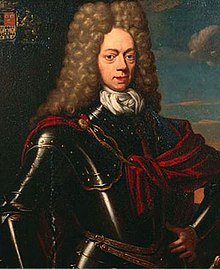Juan Guillermo Riperdá
Juan Guillermo Riperdá , baron , later duke (Spanish: duque), von Riperdá (born March 7, 1680 or 1682 in Oldehove , Groningen , Netherlands ; † November 5, 1737 in Tétouan , Morocco ), born as Johan Willem Baron Ripperda , Lord von Englumborg and Jensema , was a political adventurer and Spanish minister during the reign of Philip V of Spain.
Life
Ripperda came from an ancient catholic family from the Netherlands. His parents were Baron Ludolph Luirdt Ripperda tot Winsum and Maria Isabella van Deest. At a young age he converted to Calvinism , as this was a prerequisite for his election to the States General of Groningen. He achieved the rank of colonel in the Dutch army . In 1715 he was sent to Madrid as the ambassador of the Netherlands. There he entered Spanish services, converted to Catholicism and became the agent of Giulio Alberoni , the powerful advisor to Elisabetta Farnese , the second wife of King Philip V. In Guadalajara (Spain) , he ran a textile manufacture, which failed. He then became the representative for the state-owned factories.
After Alberoni was dismissed, Riperdá remained in the closest court circle as the queen's confidante. In 1724 he was sent on an important mission to Vienna, where he brought about the Vienna Treaty , which provided for the marriage of the Spanish Infante Karl with the Austrian Emperor's daughter Maria Theresa . In addition, the Bourbons achieved that they were allowed to continue the Duchy of Parma after the ruling Farnese family died out . The Spanish mission was led by him and Juan Bautista de Orendáin .
When he returned, he was made Duke of Ripperda in gratitude. He demanded and got the post of Prime Minister ( Primero Secretario de Estado ) in place of José de Grimaldo and the responsibilities for foreign affairs , finances as well as the war and naval ministries .
Soon the result of his work in Vienna turned out to be a sham success: Ripperda had made (financial) concessions to the Austrians, which he had not been authorized to make, and withholding large sums of money. In May 1726 he therefore lost his position, and Grimaldo took over the chairmanship of the ministers again. Ripperda fled to the British embassy and was captured there. Accused of treason, he was held captive in the Alcázar of Segovia , from where, after two years, he managed to escape to England via Portugal.
He was given a great reception in London, but was then recommended that he should leave the country and return to the Netherlands. In 1730 he returned to Holland and accepted the reformed faith again. A year later he appeared at the court of Mulei Abdallah of Morocco as his friend and advisor and as a true Muslim. As the commander of the army against Spain, which he had advised to send, he was defeated near Ceuta (Gibraltar) in 1733 , which incurred the sultan's disgrace. He died in great poverty in Morocco in 1737.
swell
- Entry in the Encyclopaedia Britannica (English)
- Biography (spanish)
- Short biography (Spanish)
| personal data | |
|---|---|
| SURNAME | Riperdá, Juan Guillermo |
| ALTERNATIVE NAMES | Ripperda, Johan Willem |
| BRIEF DESCRIPTION | Dutch adventurer, Spanish minister |
| DATE OF BIRTH | March 7, 1680 or March 7, 1682 |
| PLACE OF BIRTH | Oldehove , Groningen , Netherlands |
| DATE OF DEATH | November 5, 1737 |
| Place of death | Tetouan , Morocco |
